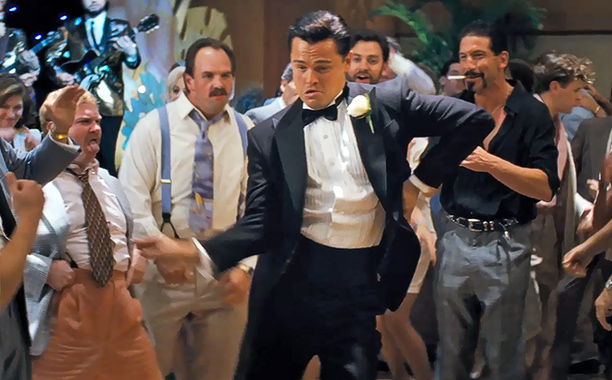
This film also uses manipulative visual tools. The audience comes in with a common societal ideological view. Even if they don't agree with societal norms, those norms are still a part of their cultural conditioning and of the resulting morality. This visual manipulation first takes them along on the "high", and then drops them into the depths of his downfall. The film begins by showing his enormous estate, gorgeous wife, and him explaining his detrimental drug habits as he snorts cocaine out of a prostitute's derriere. Driving under the influence is completely frowned upon, but he isn't driving, he is piloting his helicopter, nearly crashing it while trying to land on his estate. Assuming that the majority of the audience is middle class, this type of lifestyle would seem completely foreign and probably even so to most people in the same socioeconomic status as the main character. As the film goes back to when he was just a hungry twenty five year old trying to support his wife, this lifestyle isn't conceivable even to Jordan. The audience is very similar to the young Jordan Belford whose innocence is apparent. He has conformed to the cultural norms that most are trained to abide by from birth. As he gets into this industry, he finds it slightly immoral. His mentor tells him that to survive this job you need to need to masturbate at least twice a day, use cocaine to keep you alert, and to get the customers to keep reinvesting so the brokers can make a profit. Just like any other married man trying to support his wife and live the American Dream in the only way that he knew, which our cultural ideology taught him was correct, he was quite surprised and probably confused by the information that he was being told. However, this style of doing business gave him a way out of his apparently doomed career trajectory, which spiraled down when the market crashed. As time goes on, he loses his morals and these life choices he deemed wrong became the norm for him. They became his habitus. Not too long after that encounter with the Mentor, he succumbs to peer pressure and begins falling into this amoral lifestyle. As Jordan loses his Innocence, so does the audience. The viewer begins to desire what Jordan desires.This movie has the ability to take the audience on a roller coaster ride emotionally, morally, and spirituality, as (Cowe, 1990) suggests when he stated, "men and women in the audience may be positioned while watching a film in ways that correspond to the dynamics of their own fantasies." This is particularly true when considering the role of women in the movie, and their roles as objects for the men of the audience engaging in the male gaze. Women in the audience may relate to the use of the masquerade to gain residual power, or at least material things. The visual tools promote both the mirror stage and alignment, and so does the narration by the main character, especially as he narrates with whatever emotion he is experiencing at the time. The ultimate meaning of the movie is derived from experiencing our mutual fantasies and repressed desires through identifying with the main character via the mirror stage and alignment, and also experiencing the alienation of watching the character we identify with fall from the height of power to the depths of jail and loss.